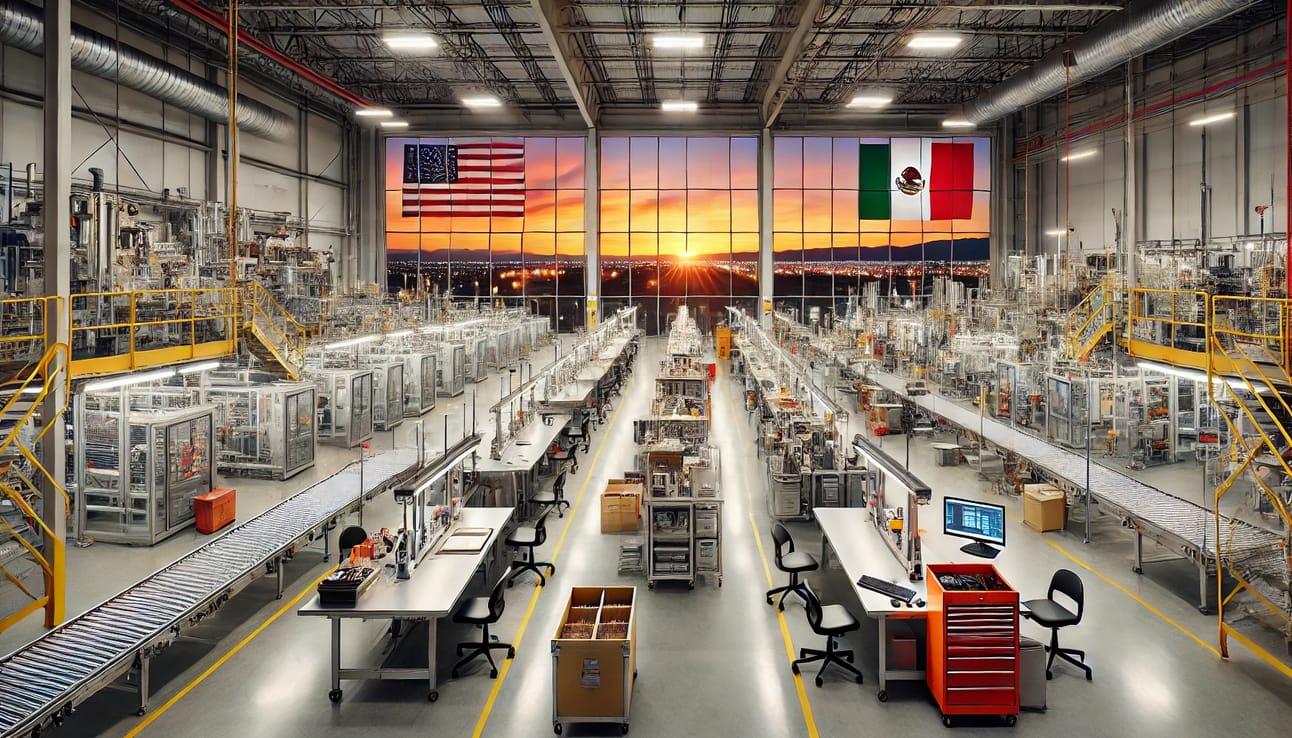What’s New This Week
{{Firstname|Good morning}}, this week, we tackle critical issues shaping global dynamics—from the staggering $4.7 trillion economic risk posed by mass deportations to the strategic importance of linguistic and cultural connections in an increasingly interconnected world. Dive into the recalibration of global trade routes, discover how bilingual communities drive innovation, and explore the role of technology in reshaping economic resilience.
First time reading? Join thousands of intellectually curious readers. Sign up here.
Inside Special Sections
Trade Winds: The $4.7 trillion cost of mass deportations and the impact on North American competitiveness.
Power Move: A major shift in global trade—how new trends are reshaping supply chains.
The Border Buzz: How bilingual border communities like Nogales are driving economic innovation.
Guest Article: Can China Be Defeated? The Geopolitics of Semiconductors (Part 3) explores Mexico’s role as a key ally to the U.S. in the global semiconductor race.
Start learning AI in 2025
Everyone talks about AI, but no one has the time to learn it. So, we found the easiest way to learn AI in as little time as possible: The Rundown AI.
It's a free AI newsletter that keeps you up-to-date on the latest AI news, and teaches you how to apply it in just 5 minutes a day.
Plus, complete the quiz after signing up and they’ll recommend the best AI tools, guides, and courses – tailored to your needs.
The Quick Courier
POLITICS
Trump Assembles Controversial Cabinet: Trump announces a transition team and cabinet picks hinting at hardline policies, raising questions about the administration’s priorities for immigration and foreign relations. Read more.
Navigating Political Divide at the Holidays: Learn how to discuss political differences, like abortion and Trump support, with family this holiday season while fostering understanding and preserving relationships. Read more.
ABC Settles with Trump for $15M: ABC agrees to pay $15 million to Donald Trump’s presidential library to settle a defamation lawsuit, raising questions about media accountability and political narratives. Read more.
Democrats’ Latino Disconnect Post-2024 Election: The Democratic Party faces new challenges in rebuilding trust with Latino voters, as shifts on immigration and cultural issues reveal cracks in their coalition after the 2024 election. Read more.
TRADE
Trump Tariffs Could Drive Up Trucking Costs: Economists warn that reinstating Trump-era tariffs could strain supply chains and increase trucking costs, impacting prices across industries reliant on cross-border trade. Read more.
Mexico Tops U.S. Holiday Travel Destinations: As year-end travel booms, Mexico joins the Bahamas and Dominican Republic as top international picks for U.S. travelers, highlighting its enduring appeal. Read more.
Digital Bridges Transform U.S.-Mexico Trade: Explore how technology is reshaping U.S.-Mexico trade, from streamlined customs processes to digital platforms fostering cross-border commerce. Read more.
Dreamliner Diverts Due to Pig Stench: A Boeing 787 bound for Mexico City was forced to land in Bermuda after 100 live pigs in the cargo hold created an unbearable stench, disrupting the flight. Read more.
SECURITY AND MIGRATION
Climate Change Fuels Migration Crisis: Rising climate pressures in Mexico are driving undocumented migration to the U.S., spotlighting the intersection of environmental and immigration challenges. Read more.
Texas Leases Land for Deportation Efforts: The Trump administration accepts Texas’ offer to lease land on the Mexico border to support expanded deportation operations, intensifying immigration enforcement. Read more.
Canada Boosts Border Security to Avoid U.S. Tariffs: In response to Trump’s concerns, Canada announces border security upgrades aimed at preventing tariffs and ensuring smoother trade relations with the U.S. Read more.
Trade Winds
Workforce Exodus: The Trillion-Dollar Consequence of Mass Deportations

North American Competitiveness
Mass deportations represent large-scale government-mandated removals of immigrant populations, often targeting undocumented residents or specific ethnic groups. Historically, such policies have caused profound social and economic disruptions. During the 1930s, the United States conducted the Mexican Repatriation, forcibly removing an estimated 2 million people of Mexican descent—including many U.S. citizens—during the Great Depression. This campaign devastated agricultural communities, separated families, and caused severe economic damage to regions dependent on immigrant labor.
Interested about how mass deportations could decimate North America's economy? Discover the $4.7 trillion hidden cost of removing millions of skilled workers. Uncover how these policies threaten supply chains, innovation, and our global competitive edge. Learn why talent matters more than borders in today's interconnected world. Explore the full economic impact here.
Power Move
Mexico Overtakes China as Top U.S. Trading Partner

U.S.-Mexico Trade
The Development
Recent U.S. Census Bureau data indicates that in the first half of 2024, U.S.-Mexico trade totaled approximately $415.4 billion, edging out China’s roughly $269.2 billion. After years of China’s leading position, this shift underscores how nearshoring, geopolitical considerations, and the stability afforded by the USMCA are realigning the U.S. trading landscape.
Why It Matters
This change isn’t just a statistical blip. It reflects a broader recalibration of North American supply chains. With rising tariffs, pandemic disruptions, and evolving security considerations, companies are choosing nearshoring over distant sourcing. Mexico’s proximity, growing manufacturing capabilities, and established trade frameworks offer a compelling alternative to overseas production.
Impact on the Ground
Shorter transit times and reduced freight costs give U.S. consumers quicker access to goods. Mexican manufacturers, long known for quality in automotive, aerospace, and electronics, are poised to capture more investment. This shift can fuel employment, infrastructure upgrades, and deeper regional integration.
Winners and Losers
U.S. firms benefit from more reliable supply chains, potentially lower costs, and improved responsiveness to market changes. Mexican exporters gain enhanced market share, while infrastructure and logistics industries experience growth. Meanwhile, distant suppliers, particularly in China, risk losing U.S. market share as production reorients closer to home.
Beyond the Numbers
This development underscores the strategic importance of the U.S.-Mexico relationship—one that’s increasingly about building resilient, flexible, and secure supply chains. It’s about ensuring competitiveness in a world where stability, speed, and trust matter as much as cost.
The Outlook
If current trends hold, North America may be entering a new era of trade cooperation and shared prosperity. By leveraging geographic advantages, skilled labor, and strong regulatory frameworks, the U.S.-Mexico partnership could help set the standard for a more balanced, responsive, and sustainable model of global commerce.
The Border Buzz
Border Bilingualism: How Language Skills Drive Cross-Border Economic Success

Border Bilingualism
Growing up in Nogales isn't just about living between two countries—it's experiencing a world where languages breathe and cultures merge. Here, English and Spanish aren't just words; they're living bridges connecting families, businesses, and dreams.
At family gatherings, conversations seamlessly dance between languages. In local schools, being bilingual isn't extraordinary—it's simply how we communicate. For generations, border community residents have moved effortlessly between English and Spanish, transforming communication from a challenge into an opportunity.
Beyond Words: An Economic Advantage
Bilingual skills represent more than personal capability—they're a strategic economic resource. As U.S.-Mexico trade expands, these linguistic abilities become powerful tools:
Seamless cross-cultural communication
Enhanced business negotiations
Deeper market understanding
Increased operational efficiency
Businesses now recognize what border communities have always known: language is about understanding context and building genuine connections. Local entrepreneurs use bilingual skills to forge international partnerships, reaching customers from Tucson to Tijuana with remarkable ease.
The Deeper Impact
Bilingualism in border regions represents:
Cultural intelligence
Strategic communication
Professional adaptability
Economic bridgebuilding
Conclusion
In cities like Nogales, bilingualism isn't a learned skill—it's a way of life. As trade between the U.S. and Mexico grows, these linguistic capabilities become our most valuable export. We're not just speaking two languages; we're creating economic opportunities, one conversation at a time.
Border cities aren't just locations—they're living laboratories of economic innovation, powered by the ability to truly understand one another.
GUEST ARTICLE
Can China Be Defeated? The Geopolitics of Semiconductors (Part 3)
Mexico as a Strategic Ally of the United States in the Chip War
Amid the global race for semiconductor dominance, Mexico is emerging as a strategic ally for the United States. Geographical proximity and strong commercial ties under the USMCA (United States-Mexico-Canada Agreement) offer Mexico a unique opportunity to integrate into the North American chip supply chain. With its skilled workforce and competitive costs, Mexico is attracting investment in advanced manufacturing.
However, challenges remain. Limited investment in research and development highlights the need to strengthen Mexico’s technological and educational infrastructure. To foster innovation, Mexico must create public policies that encourage foreign investment and collaboration among government, industry, and academia. Equally critical is expanding STEM education to build a workforce capable of supporting high-tech industries, alongside a regulatory environment that facilitates growth.
Mexico’s strategic importance to the U.S. lies in bolstering a resilient semiconductor supply chain, particularly as tensions with China escalate. By improving its production and technological capacities, Mexico can not only support its northern neighbor but also drive its own economic development. Involvement in the semiconductor industry would spur job creation, enable technology transfer, and enhance global competitiveness.
To succeed, Mexico must address its current shortcomings and seize the opportunities offered by the evolving global semiconductor market. By doing so, it can strengthen its alliance with the U.S. and establish itself as a key player in this critical sector, contributing to a balanced global tech landscape.
Power Poll
What would you like to see more of in this newsletter?
Join the Conversation
Thanks for reading this edition of my newsletter! I'd love to hear from you. Share your thoughts about what you think are the most critical issues that need to be addressed. Email me at [email protected] or connect with me on social media using the hashtag #Intermestic.
Stay Informed, Stay Connected!
Subscribe to my blog at www.marcolopez.com.
Follow me on X, LinkedIn, and Facebook for the latest news and updates.
Share this newsletter with your network and help spread the word!
Let's keep the conversation going!

